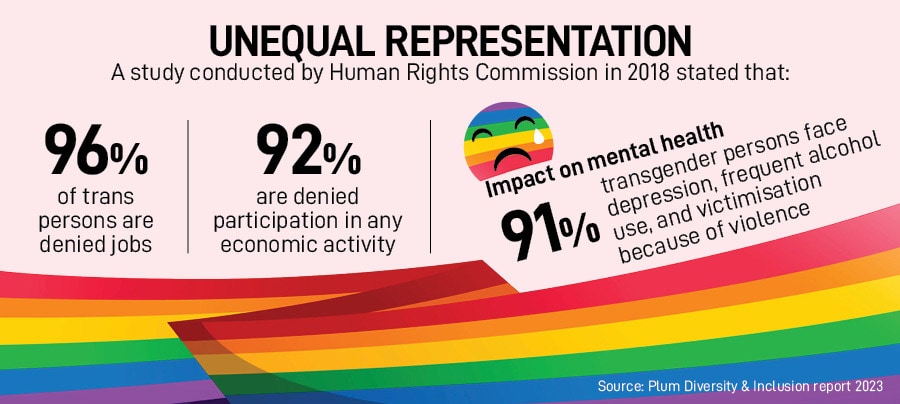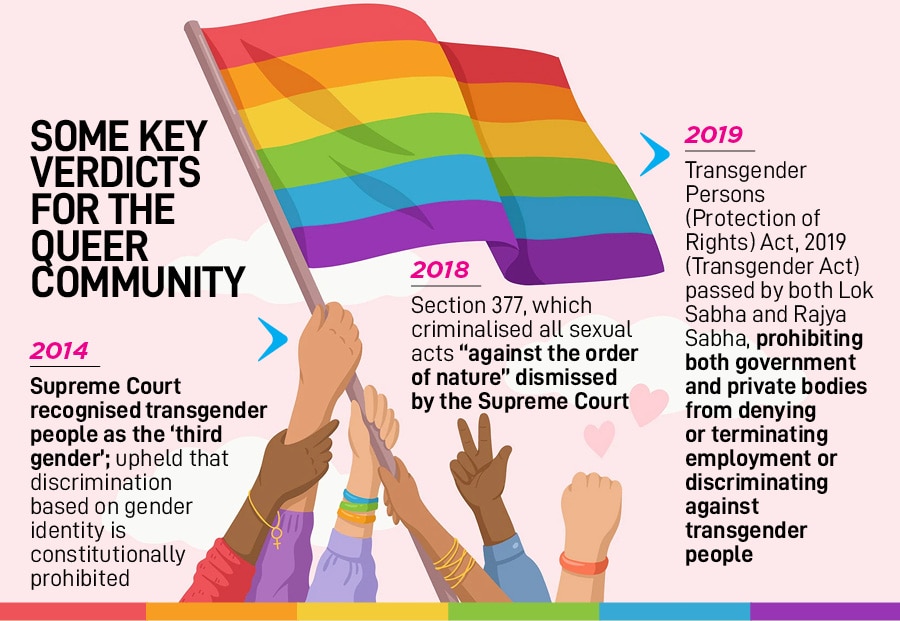Pride Month: Are Indian workplaces queer-friendly enough?
While companies are trying to adopt newer ways to implement diversity and inclusion at workplaces, employees are not fully satisfied


Jaspal Singh, 27, who works with one of the top audit houses in India, is worried that he and his fellow queer employees won’t be received as “normal" if they came out at their office. He says the policies for LGBTQ+ employees at the workplace are not part of the onboarding process, and are hence unclear. “There are a few rudimentary procedures such as employees being able to raise concerns to the internal committees. We are concerned, however, that we will not be received as perfectly capable if we wore our pride on our sleeves. So we conceal our sexual orientation and pass off as straight to avoid any conflict," says Singh.
In India, and also the world over, many organisations are trying hard to sell themselves as an inclusive workplace with gender-neutral policies, awareness sessions, insurance and medical policies for the queer people etc. But, at a team or an individual level, the reality is at odds.
Fatima Khan (name changed), working as an HR consultant in the Diversity & Inclusions team at a multinational conglomerate, feels controlling the everyday work environment to ensure zero discrimination is an issue. “If we hire someone from the queer community, it is difficult to ensure they won’t face subtle or passive forms of discrimination. We are trying to take this up with inclusivity sessions and awareness workshops and I think more than policies, we need more of implementation and execution," says Khan, who identifies as pansexual.
Indeed, walking the talk is difficult for organisations. Khan mentions that, as a part of the diversity and inclusion team, the current representation of women and specially-abled employees at their workplace is itself a work-in-progress and hence branching out to the queer community has taken a backseat.
Aparna Mittal, an equality, diversity and inclusion advisor, and a corporate lawyer with over 19 years of experience explains the reason behind this gap. Most companies have not fully understood the importance of inclusive hiring and retaining a diverse demography at the organisation, she says. The understanding of why diversity, equity and inclusion (DEI) at workplaces is important and the multiple diversities / facets of DEI, is still quite primitive. “The first challenge is for people to understand that DEI is relevant, it needs to be done, and then how it should be done, only then we can come to implementation," says Mittal. 
Based on a personal experience at a previous workplace, Singh shares how policies for the queer community being in place don’t matter as much because HR individuals aren’t very keen on resolving them. “I personally was at the receiving end of crude queer jokes after a co-worker at one of my previous jobs joined Grindr as a ‘joke’ and found my profile. When talking to him one-on-one didn"t help, I had approached my HR who was quite dismissive. His continuous taunts ended up with me resigning from the organisation as soon as I could."
According to a study conducted by the Human Rights Commission in 2018, 96 percent of trans persons are denied jobs and 92 percent are denied participation in any economic activity. As per a World Bank study conducted in 2014, up to 1.7 percent of India’s GDP is lost out every year through LGBTQ+ exclusion. More recently, a 2022 study conducted by HR consulting firm Randstad India revealed that 53 percent of Indian companies do not have career-development opportunities for people from the LGBTQ+ community. It further revealed that only 9.5 percent of the surveyed organisations have made extremely significant efforts to be LGBTQ+ inclusive.
Also see: Pride and no prejudice
Having extensive hands-on experience as the founder of SamÄna Centre for Gender, Policy and Law, a consultancy focused on Diversity, Equity & Inclusion (DEI), Environmental, Social & Governance (ESG) and Prevention of Sexual Harassment (PoSH), Mittal believes that everything, from a small local neighbourhood store to a big conglomerate or MNC, is part of corporate India, and with this imagination of a real corporate India, we haven"t even gone beyond 5-10 percent with regards to LGBTQ+ inclusion work and policies. “Work is definitely happening at a good pace now, but it is happening in limited pockets," she adds. 
Twenty-four year old Megha Choudhary, who works in a renowned food-delivery platform, says, “There are basic HR policies in place but there is nothing which is specifically queer-centric. There is a general acceptance within the company, yet there are a few people who lack awareness and often make fun of the community and its elements, and try to pass it off by claiming to be joking." Singh agrees. According to him, the heterosexual view of the policies is that they are adequate and implemented with parity, however a queer viewpoint reveals there is a glaring difference between what is intended and what is actually executed.
The Indian government and the justice system have passed several landmark judgements in favour of the queer community. Some include the 2014 judgement where the Supreme Court (SC) recognised transgender people as the ‘third gender’ and upheld that discrimination based on gender identity is constitutionally prohibited. Then, in 2018, the SC decriminalised Section 377, and, in 2019, the Transgender Persons (Protection of Rights) Act, 2019 (Transgender Act) was passed by both the Lok Sabha and the Rajya Sabha, prohibiting both government and private bodies from denying or terminating employment or discriminating against transgender people. 
According to Mittal, while there are lofty ideals of equality and non-discrimination enshrined in the Constitution, their implementation, especially in the private sector remains low, and India does not have comprehensive micro laws that convert these ideals into implementable laws or frameworks. “In terms of the legal gaps, I think a lot of the real, practical day to day rights—right to marry and for legal recognition of the marriage, right to medical insurance for the same sex partner, rights for a homosexual couple to adopt a child—a lot of these personal rights are still not available to the LGBT community entirely and that remains an area where they are continuing their pursuit for equality and justice."
Besides providing medical insurance coverage for same-sex partners and having transgender employee protection policies, which many organisations have started to implement, Indian as well as multinational companies are thinking out of the box by coming up with new and innovative ways to create awareness, conversation, and to ensure maximum adoption and implementation of inclusive HR policies.
General Electric (GE) has recently launched a programme called Elevate to encourage potential employees from diverse groups to learn and upgrade their skills in a safe environment. Additionally, engineers at GE’s John F Welch Technology Centre (JFWTC) in Bengaluru have developed an in-house tool called the JD Decoder to help hiring managers write more inclusive job descriptions. “We have also onboarded an LGBTQIA+ inclusion-focussed organisation as an approved talent acquisition partner for ensuring inclusivity in their external hiring activities," says Sukla Chandra, senior managing director, licensing and inclusion and diversity leader, GE South Asia. The company also regularly participates in LGBTQIA+ focussed job fairs and has made successful offers to candidates.
Other companies, which are adopting newer inclusive HR policies for the queer community, include professional services company Accenture that has ongoing sensitisation campaigns to help their employees understand the nuances of gender expression and identity, and the use of inclusive pronouns. “Our global LGBTIQ+ ally network of 119,000+ people is enabled through training and mentoring programmes to become more informed and vocal advocates of Pride. We encourage all our people to speak up and have several formal channels to report misconduct, discrimination or harassment," says Lakshmi C, managing director and lead—human resources, Accenture India.
Another such company, also dealing in professional services, is Marsh McLennan that has four active Colleague Resource Groups (Gender CRG, Multi-Generational, LGBTQAI+ and Disability-friendly CRG) to provide representation for all employees and develop initiatives and practices that enhance mutual understanding and promote a culture of respect. “Through our social impact programmes, we offer colleagues to support communities and help make an impact in the communities we operate in," says Jaspreet Singh Bakshi, India human resources leader, Marsh McLennan.
Deloitte India has introduced Speak-up, a confidential and anonymous channel to report misbehaviour of any kind, including discrimination or harassment due to sexual orientation. The company also has a confidential counselling helpline which is queer-affirmative—so that LGBTQ+ callers don’t face judgement or detrimental guidance. The company is also leveraging technology for its diversity and inclusion efforts. “We have introduced the PronounceIt widget on Outlook which helps colleagues from across geographies indicate their preferred name as well as the accurate pronunciation for it, so that people are respectful of our cultural diversity while setting up meetings," says Saraswathi Kasturirangan, chief happiness officer, Deloitte India. 
Jeet Shah, CPO, and Renitaa Keswani, COO of NOFILTR.Group, an influencer marketing agency, say it’s not just their employees but also about their creators for whom they aim for safety. The company follows the policy of not discriminating between gender, community or any social, material group frames. “We have both employees and creators from the queer community and we make sure they are heard equally as compared to other employees and creators," says Keswani. “In anticipation of the verdict on same-sex marriage in India, we have already implemented a more comprehensive diversity and inclusion policy to ensure our employees are well-informed and educated on LGBTQ+ issues," adds Shah.
Zoo Media, India"s first homegrown independent agency network, also has similar views on the awaited same-sex marriage verdict. “Our organisation welcomes individuals for who they are and not what they feel via their gender preferences. If the verdict is in favour of same-sex marriage, we will love to ensure extended support to partners of the LGBTQ+ community members, such as insurance and other health benefits," says Tanima Dhawan, national HR director at Zoo Media.
Companies are also taking help from influencers, activists and lawyers to conduct sessions in their organisations around gender sensitisation and awareness. For example, tech company Plum recently invited Harish Iyer, equal rights activist, to talk about the subtle ways in which workplace policies impact underrepresented groups, such as the LGBTQIA+ community and people with disabilities, and the importance of crafting inclusive practices within the workplace to ensure equal treatment and support for all employees. In the past, the company has also invited TV personality Renil Abraham, and Yogi and Kabeer, hosts of India"s renowned LGBTQIA+ podcast Shuddh Desi Gay, for these sessions. “We recently conducted a session called "How an Employee Can Be an LGBTQ Ally" to ensure that our LGBTQ employees feel equal and comfortable," says Zoheab Rehaman, Head of People Success at Plum.Mittal explains that all organisations in India—those starting out and those that have been around for years—need to understand that inclusion policies and initiatives for the LGBTQ+ community is a nuanced area. Merely copying certain policies working in the West will not be enough. They need to be customised in an Indian context, that too tailored to industries and sectors. “It"s important for companies to work with somebody who understands the entire gamut of how this has to be done, the best practices and pitfalls, and intentionally curate those policies mindfully. Inclusion and inclusive policies will not happen with the click of a button. A lot of thinking and hard work needs to go through and a lot of processes need to be built over time," she concludes.
First Published: Jun 14, 2023, 11:49
Subscribe Now